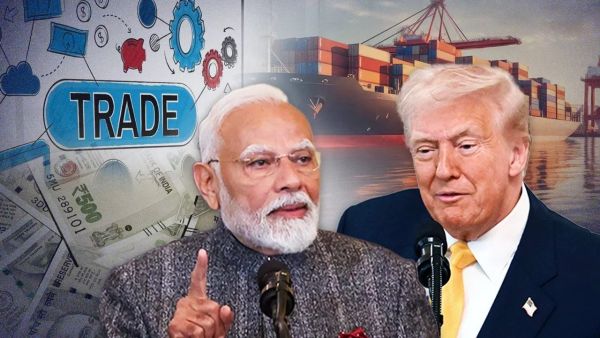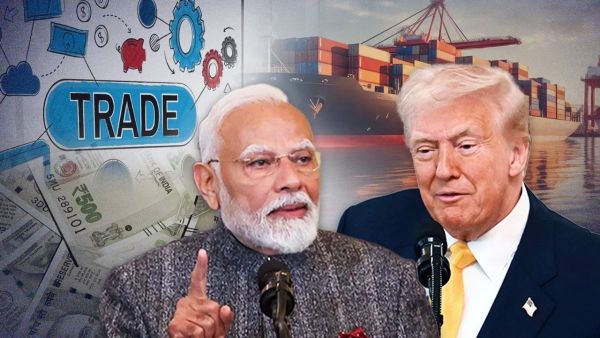

Donald trump tariff
Once again, US President Donald Trump had fixed the deadline of July 9 for Tariff, but this time India cleverly managed the deadline and settled the pressure of Trump's tariff (fee) in a diplomatic manner. When early this year, Trump once again took a tough stance on the trade issue and promised 90 deals in 90 days, it felt that history would repeat itself. His threats and tariff warings tried to put pressure on the big trade partners of America. But this time the world's response was different from before and India was involved in the few countries that kept themselves from this tussle.
On the passing of the deadline of July 9, Trump sent strict letters to many countries and warned India to levy heavy duty, but India, who is a big exporter to the US and was also on the target of Trump, no such letter was found. This was not a coincidence, but is the result of India's well-planned diplomacy. Indian officials said that talks are still going on, which is clear that India's strategy managed to weaken Trump's tariff's threat.
India's way of pressure of Trump is clear, talk, but do not bend. Recently, Commerce Minister Piyush Goyal, who returned from Washington, had clearly said that India will not make any deal in a hurry in the affair of any arbitrary deadline. It was not just for within India, but the US also had a clear indication that India is ready to negotiate, but will compromise on its own terms.
This strategy has two foundation patience and preparation. India has kept the doors of talks open, many times the teams have been sent to Washington. Also, do not take any kind of inflammatory statements or steps that increase tension. As a result, India remained in the conversation and did not show weak or bent.
However, the threat of Trump's tariff remains still, especially in the sector of Forma. Trump had lashed out to impose a fee of up to 200% on pharma import, which could have caused great loss to India, as India is a big supplier of generic drugs to America. Nevertheless, India has not received any formal threatening letter so far, while many other countries have received. This means that Trump is looking at the expectation of a mini deal with India, which he can present as his victory, while the matter is stuck with the rest of the countries. Not sending a letter is not just a formality, but a part of Trump's strategy. Trump knows that India can deal quickly compared to Japan, South Korea and Europe.
While other countries have been adamant, India has kept the path of talks open. Japan has clearly stated that he will not open the 2020 bilateral trade deal again. South Korea has also said that he first wants a large level of concessions. Europe has taken a tough stance by calling Trump's threats a political drama.
On the contrary, India is actively interacting and soon another delegation will go to Washington. Special Secretary Rajesh Aggarwal has also said that the conversation is going on. He is the main negotiator of the proposed Indo-US bilateral trade agreement. The effort is that the first part of this deal should be completed by September-October this year. Prior to this, both countries are trying to finalize an interim trade agreement.
Government sources told ANI that soon the Indian delegation will go to Washington and talk face to face. Apart from this, many virtual meetings have also been held in recent weeks. All this shows that India is ready for the deal, but on its terms. The same thing draws Trump towards India, who has not got any major success after the July 9 deadline. A limited compromise on pharma, digital commerce and a lot of agricultural products can also become a win for Trump.
Both sides are looking towards the practical agreement. A very big free trade deal is not possible so soon, but the small compromise on some important sectors will be right for both. Trump can count it in its 90 deals and India can maintain a hold in the American market by keeping its agriculture and dairy safe. Whether or not the new deadline of August 1 will be done, it is not clear yet. Trump himself has said that this deadline is not 100% fixed. This has given India a chance to draw talks, without pressure.
Overall, crossing the deadline of July 9 quietly is a quiet but very diplomatic victory for India. India showed that it could remain a strong partner without bowing, without giving a fierce reaction. If India also crossed the soft deadline of August 1 and still Trump did not send any threatening letter, then it will prove that Trump is ready to give concessions to India, which he does not give to the rest of the countries.
The coming weeks will be very important. If India makes a limited agreement with the US on its own terms, then it will be evidence of India's diplomatic strength in front of the world's most uncertain and fiery leader.